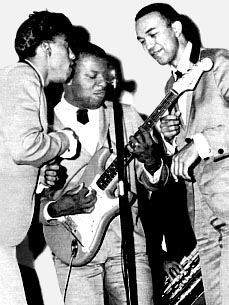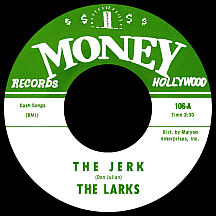THE LARKS
The Jerk
One of the most popular dances of the mid-1960s was "The Swim," its moves made obvious by "C'mon and Swim" singer Bobby Freeman once he demonstrated them on TV. Another, "The Twine," a somewhat free-form twirling progression begun in Chicago, was popularized on a national level by "Twine Time" shouter Alvin Cash and his three preadolescent brothers, who forfeited their given names in favor of the collective Crawlers. Then there was "The Jerk," a thrusting, jerking movement aptly identified. For a decade, singer and guitarist Don Julian had been fronting a succession of groups under variations of the Meadowlarks moniker; the 1964 configuration, a trio called The Larks, was responsible for the hit record that placed "The Jerk" high on the "dances to do" list that fall and for a couple of years after. It was Julian's only national hit among the dozens of recordings he made.
Don started his first group, The Soulinaires, around 1953 with three of his buddies at Fremont High in South Central Los Angeles: baritone Earl Jones, his bass-voiced brother Randy Jones and tenor Ronald Barrett (whose sister, Fanita Barrett, later performed as Fanita James with The Blossoms and Bob B. Soxx and the Blue Jeans). Joe Bihari of Modern/RPM Records gave them a shot in '54, resulting in a single on RPM under a new name, The Meadow Larks; "Love Only You" misfired (sounding too much like The Crows' high-profile hit "Gee"). A second effort (as The Meadowlarks), "Pass the Gin," lacked originality, coming late in a long line of drinking songs, one of the predominant themes in early-'50s R&B. A stint as backing singers credited Percy Mayfield with his Maytones on two Specialty singles, "My Heart is Cryin'" and "Baby, You're Rich," the only time they used that name, for obvious reasons.
Randy joined The Flairs (of Modern's Flair label) and Don replaced him with white tenor Glenn Reagan. Earl took over the bass spot and the racially-integrated act (there were few in those days) auditioned for Dootone Records owner Walter "Dootsie" Williams, who'd been raking in the dough with The Penguins' huge hit, "Earth Angel." Julian had written a ballad, "Heaven and Paradise," which Dootsie released in early '55 on his alternatively-named Dooto label crediting Don Julian and the Meadowlarks. Billboard's April review of the song was oddly worded: "A lazy beat ballad very prettily harmonized." It caught on in several mostly-coastal cities yet didn't appear on any national charts; timing would later factor into its belated success. Imitating themselves must have been a hard habit to shake, as follow-ups "Always and Always," "This Must Be Paradise" and "Please Love a Fool" strayed little from the initial sound (some flip sides, like "Big Mama Wants to Rock," thumped harder). Lineup changes were common and when Dootsie cut them loose in '57, only Julian and Earl were still with the act, back to using the shorter Meadowlarks trademark.
Leaving South Central L.A., Julian cruised a few miles up the road to Hollywood and convinced Original Sound Records owner Art Laboe to let him lay down some tracks. The obligatory ballad, "Please (Say You Love Me)," was backed by the Latin-flavored "Doin' the Cha Cha Cha," a style apparently too many others were doin' in 1958. Working with Laboe, if ever so briefly, was a stroke of luck for Julian and his group; Art chose "Heaven and Paradise" as one of the 12 tracks on his precedent-setting 1959 Oldies But Goodies compilation (that coincidentally provided a name for the "oldies" radio format of later decades). Any exposure the song lacked back in '55 was compensated tenfold due to its inclusion in the top-selling first installment of Laboe's durable series of LPs. Having suddenly been placed on a pedestal as doo wop legends, they recorded and performed as Don Julian and the Meadowlarks for the next few years. Varying members (Don the only constant) cranked out singles on Original Sound plus the Interlude and Dynamite labels, usually latching onto current trends blazed by others. "The Booglay," a nonsensical "Hully Gully"-type dance tune on the Magnum label, was the last of a lengthy string of failed efforts.

It seemed to Don a change was in order; slashing the name even further, to The Larks, wouldn't seem to be the smartest move, as other groups had already used it, most notably New York's Larks led by Gene Mumford on the Apollo label, active in the first half of the '50s with a couple of great hits in 1951, "Eyesight to the Blind" and "Little Side Car." More recently a Larks group from Philadelphia with lead singer Cleopatra McDougal had made a minor commotion with a terrific ballad, "It's Unbelievable," on Sheryl in '61. And there were other Larks of lesser note. Julian's group came on in mid-1964 as a trio with Ted Walters and Charles Morrison completing the act. Returning to the old Central Ave. neighborhood, they latched onto the latest dance craze, leading the way this time around with "The Jerk," released on a notorious independent local label, Money Records.
John Dolphin had been a figurehead in the South Central L.A. music scene, running his inaccurately-but-impressively-named Dolphin's of Hollywood record shop, where popular deejays frequently did live broadcasts and star R&B singers often made personal appearances. He'd marked his territory as a record-producing wheeler-dealer in the early 1950s with the Recorded in Hollywood, Cash and Money labels, but in 1958 Percy Ivy, a questionable singer he'd shown little interest in, shot and killed the 55-year-old Dolphin over some petty disagreement. His widow, Ruth Dolphin, was running Money Records when Julian's Larks happened along six years later.
"The Jerk" was a much-needed hit for the company. Breaking in Los Angeles in October '64, it reached number one locally by Thanksgiving and went top ten nationally just after Christmas. The quirky dance sparked a mini-explosion of "Jerk" songs, some of them sizeable hits. Two from Motown, "Come On Do the Jerk" by The Miracles and "Can You Jerk Like Me" by The Contours, were climbing the charts by year's end. Jackie Ross combined two timely dances, "Jerk and Twine," on Chess, and The Gypsies managed to "Jerk It" on Old Town early in '65. Detroit trio The Capitols kept the dance fresh and funny in the spring of '66 with their top ten hit, "Cool Jerk."
The Larks stayed with the theme, shrewdly contrasting the hit single's sound on "Mickey's East Coast Jerk," presumably to get more action on eastern U.S. stations, where acceptance of "The Jerk" hadn't been as strong as it had out west. Then Don started Jerk Records and cranked out more than 20 singles over several years, alternating releases on Money and his own Jerk label, usually tying into flavor-of-the-moment dances (and taking at least one more shot at his favorite, presenting it as "Philly Jerk" in '66). Label billing used every variation of Larks, Meadowlarks, Don Julian and the Meadowlarks/Larks and, in some cases, solo credit to Don alone. In 1973, he composed a funk soundtrack for Savage!, an action/blaxplotiation film on a much lower budgetary level than the box office hits (Shaft, Superfly) that defined the genre. Leading up to his death in 1998 at age 61, Don Julian kept producing records and forming new groups, traveling down his own winding musical path for well over 40 years.


